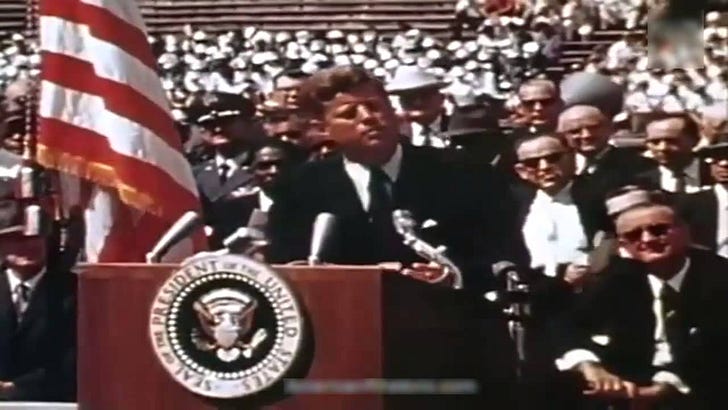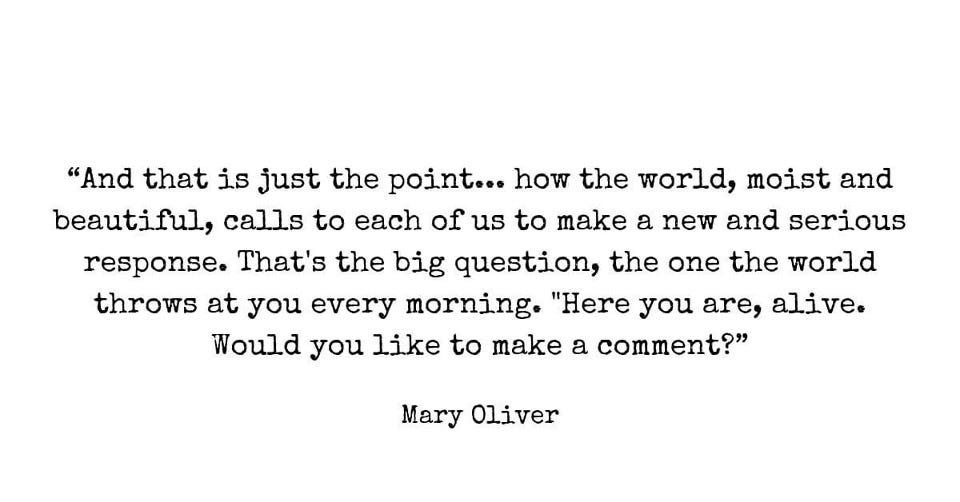The Two-Part Finale of 'I Dissent.'
This concludes an eight-part patient advocacy manifesto, I Dissent.
This concludes an eight-part patient advocacy manifesto, I Dissent.
PART SEVEN: THE BODY ELECTRIC ACT
“Space and related industries are generating new demands in investment and skilled personnel, and this city and this State, and this region, will share greatly in this growth. What was once the furthest outpost on the old frontier of the West will be the furthest outpost on the new frontier of science and space.
But if I were to say, my fellow citizens, that we shall send to the moon, 240,000 miles away from the control station in Houston, a giant rocket more than 300 feet tall, the length of this football field, made of new metal alloys, some of which have not yet been invented, capable of standing heat and stresses several times more than have ever been experienced, fitted together with a precision better than the finest watch, carrying all the equipment needed for propulsion, guidance, control, communications, food and survival, on an untried mission, to an unknown celestial body, and then return it safely to earth, re-entering the atmosphere at speeds of over 25,000 miles per hour, causing heat about half that of the temperature of the sun – almost as hot as it is here today – and do all this, and do it right, and do it first before this decade is out – then we must be bold.” ~ JFK
While the majority of patients want better treatment options and cures, those in positions of power across the medical field allow the racket to perpetuate, even though, regardless of party, all of us see the racket. It’s like watching the mob patrol the streets. It has become an accepted evil; some of us pay dues for protection, and others avoid contact at all – but nevertheless, none of us are spared its impact.
As I have outlined in the preceding essays, where there is much wrong, there is much to address.
But let’s start here:
Congress should pass The Body Electric Act.
Modeled utilizing the successful Act for ALS legislation, The Body Electric Act will do three things:
An Expanded Access grant program that funds research on and provides access to promising investigational bioelectronic medicine therapies and devices to mitigate, treat, or cure inflammatory, neurological, or oncological diseases or conditions.
A public-private partnership of research and development of bioelectronic medicine jointly led by the Food and Drug Administration (FDA) and the National Institutes of Health (NIH). This will be the first federal effort explicitly charged with speeding the development and approval of bioelectronic therapies.
A bioelectronic medicine grant program at the FDA that will fund research on and development of bioelectronic medicine therapies and devices to mitigate, treat, or cure diseases using electricity through either open or closed loop devices, ultrasound, or other novel bioelectronic therapies.
Upon outlining his plans to fund NASA and take us to the moon, JFK acknowledged that this was a lofty price tag and a bold charge, but said:
“I think that we must pay what needs to be paid. I don't think we ought to waste any money, but I think we ought to do the job. It may be done while some of you are still here at school at this college and university. It will be done during the term of office of some of the people who sit here on this platform. But it will be done. And it will be done before the end of this decade.”
So, too, I hope that patients will get behind The Body Electric Act and call on Congress to get the job done: fund research and trials, expand access, and accelerate translation.
PART EIGHT: SO, WHAT ARE YOU GOING TO DO ABOUT THAT?
“Why, some say, the moon? Why choose this as our goal? And they may well ask why climb the highest mountain? Why, 35 years ago, fly the Atlantic? We choose to go to the moon. We choose to go to the moon in this decade and do the other things, not because they are easy, but because they are hard, because that goal will serve to organize and measure the best of our energies and skills, because that challenge is one that we are willing to accept, one we are unwilling to postpone, and one which we intend to win, and the others, too.” ~ JFK
WITH MALICE TOWARD NONE, WITH CHARITY FOR ALL.
Once upon a time, as a naïve, scared out of my mind college graduate teaching at a relatively rough and tumble high school in Hawaii, wondering what Piaget or Gardner or Dewey would do while trying to manage my unruly classroom in a school with very little support and fewer resources, a veteran teacher who became one of my dearest friends asked me a question that changed the trajectory of my life.
Whenever I saw him out on the quad, in-between classes, he always made a point to ask me how things were going, and I told him what was on my mind and what struggles I was having.
In one of our early conversations, he listened thoughtfully as I got it all out of my system, then tilted his head, and kindly and gently said to me, “So what are you going to do about that?”
So that is what I continue to ask myself today; it is why I wrote this manifesto.
And it is what I ask all of you.
Let this serve as an official cease-and-desist letter of petty bullshit and let’s come together to get the job done.
That’s all we’re here to do.
As the Dalai Lama said:
“Our prime purpose in this life is to help others. And if you can’t help them, at least don’t hurt them.”
Thanks to Dr. Sydney Farber and his call to action for funding novel research, the original ‘Jimmy,’ Einar, went on to live a robust, healthy, and happy life – something all patients deserve the right to as well.
The compartmentalization of identity has impacted every facet of society today and altered the trajectory of our culture, and that is also true for the patient population.
Viewing disease as a fixed trait and adopting that disease as an identity has empowered the status quo to remain the same and for therapies to remain stagnant, as we have seized our call to action of demanding cures in exchange for demanding that we own the very disease whose sole mission is to cause our demise.
The questions we now must ask ourselves are quite simple: Do you want to stop research and just be grateful for what you have? If the standard of care is working for you, but not others, do you want them to have alternative options that allow them to thrive? Do you want those who come after you to have access to better therapies, or have the chance to not need them at all? Or do you want research to come to a screeching halt to allow disease to remain an identity?
In our search for meaning and our desire to find purpose that makes the suffering of existence bearable, we do ourselves and those who come after us a disservice by including disease as a fixed trait and identifying factor.
Medicine has come a long way in the last 122 years since Princess Ka’iulani died from complications due to inflammation. Let’s ensure that what we do today paves the way so that 10, 20, 50, and 122 years from now, inflammatory diseases will be in the trash bin of history.
To do so requires much more than empty acknowledgments; it requires action. And it requires that we believe we are more than the sum of our limitations, and that we, and those who come after us, could indeed become better. We must define ourselves by so much more than what attempts to inhibit us, and instead use adversity as our fuel.
The work that is happening within the field of bioelectronic medicine is a story, and once upon a time, that story began with one man deciding that the world had some room for significant improvement. From there, an entire field has been built on this one premise: that electrically stimulating nerves can eliminate suffering. Thousands of researchers with their own stories have flooded into this field, contributing to the mural that, as Dr. Tracey has said, is being painted all over the world at different research institutions, hospitals, and organizations.
I have been a direct beneficiary of those who have contributed to writing this story. It has transformed the ending of my own and will change the ending of the stories of millions of others who are still suffering.
Reflecting on Mark Twain’s quote about being born at the age of eighty and gradually approaching eighteen, when I first heard this quote, it made me laugh, because that is such a perfect way to encapsulate what my life feels like – and what a gift that is. And this life I have today has been made possible by those who dared to see beyond the paradigm, and in doing so, made me, and so many others like me, more than a statistic.
Now, it is our collective duty to work together across every patient foundation, academic institution, industry startup, and hospital system to do better than our predecessors who are holding tight to the status quo, and in doing so, are keeping patients sick. It is time to do the hard work not because it is our day-to-day job to do it, or because we gain notoriety and ‘influencer’ status from it, but because it is the right thing to do. To let more patients, like me, experience the awe of gradually aging from eighty to eighteen.
Let this be our century’s Apollo mission.
The work to get it done is hard, and there are going to be a lot of even harder days ahead.
But as the adage goes: if it was easy, then everyone would do it.
Thomas Edison once said that discontent is the first necessity of progress.
Let's use our discontent to do exactly that: demand progress.





Hi Kelly, I wanted to wait to comment until I read all 8 parts of your manifesto ;-). It's been my experience in trying to help navigate my son through 15 years of one drug treatment to the next, all of which have failed, that every single thing you've so eloquently expressed is true. Every patient who suffers with the diseases that bioelectric medicine was created to help know full well how very little advise or direction was given away from biologics--not even the suggestion to stop eating sugar or abstain from alcohol ( both inflammatory). It continually baffled me, but I suspected it was "Big Pharma" who had its foot on the neck of innovators like Dr Tracey by creating a narrative that would shut out anything new and uphold the pervasive view by many physicians of, "what ain't broke..." When I read the actual stats in your article stating the amount of money that these companies gain off the backs of VERY sick individuals all I could think was that they have to be sociopaths! I'm livid but motivated and am so incredibly grateful for you and those with whom you work for taking up the fight for those whose voice has weakened due to illness. The rest of us need to stand up and be their voice as well-put me in coach!